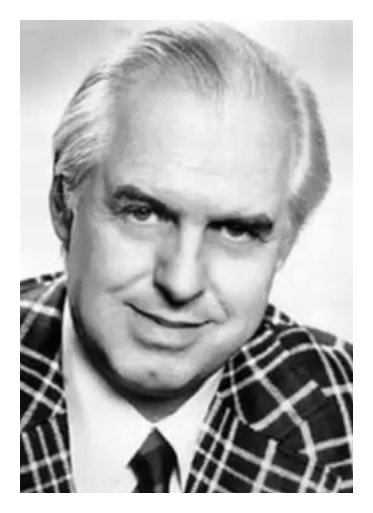

| John Macurdy (born in Detroit on
March 18, 1929) has received international acclaim as a leading Bass
(basso cantante). Since his debut at the Met in 1962, he has performed
over 1,000 times and has sung over 40 roles with that company alone. Following his service in the military during the Korean War, Macurdy made his formal debut with the New Orleans Opera Association on the opening night of the 1952-53 season, as the Old Hebrew in Samson et Dalila, with Ramón Vinay and Blanche Thebom in the cast, which was conducted by Walter Herbert and staged by Wilhelm von Wymetal. He went on to appear with that company until 1959, in Thaïs, Die Entführung aus dem Serail (conducted by Julius Rudel), The Consul by Menotti, and Norma. He was to return to New Orleans for Sarastro in Die Zauberflöte, in 1979. During those years, he also occasionally performed with other companies, notably portraying Mr Earnshaw in the world premiere of Carlisle Floyd's Wuthering Heights, at the Santa Fe Opera in 1958. In 1959, Macurdy made his New York City Opera debut, as Dr Wilson in Street Scene. Among his other roles there, until 1962, were Jabez Stone in The Devil and Daniel Webster, the Basso Cantante in Six Characters in Search of an Author (world premiere, with Beverly Sills), William Jennings Bryan in The Ballad of Baby Doe, Mr Earnshaw in Wuthering Heights (opposite Phyllis Curtin and Patricia Neway), Créon in Œdipus rex (conducted by Leopold Stokowski), Colline in La bohème, Timur in Turandot, President Prexy in The Cradle Will Rock, a Priest in Il prigioniero (with Treigle), Sparafucile in Rigoletto, Don Alfonso in Così fan tutte, the King of Egypt (later Ramfis) in Aïda, Reb Bashevi in The Golem (world premiere), and the Reverend John Hale in The Crucible by Robert Ward (with Chester Ludgin). He made a return to that ensemble in 1979, for a single performance of Raimondo in Lucia di Lammermoor. 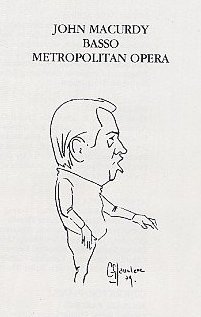 It was the Metropolitan Opera that would become Macurdy's
artistic home, starting with Tom in Un
ballo in maschera, in 1962. From then, until 1997, he would sing
more than 1000 performances in a great variety of roles, including the
King (later Ramfis) in Aïda,
Alessio (later Count Rodolfo) in La
sonnambula (opposite Dame Joan
Sutherland), Don Basilio in Il
barbiere di Siviglia, the Commendatore in Don Giovanni (perhaps his most
acclaimed role), Ferrando in Il
trovatore, Prince Gremin in Eugene
Onegin, Colline, Count des Grieux in Manon, Daland in Der fliegende Holländer,
Sparafucile, Agrippa in Antony and
Cleopatra (world premiere), King Heinrich in Lohengrin, Sarastro, Ezra Mannon in
Mourning Becomes Electra
(world premiere), Alvise in La
Gioconda, Hunding in Die
Walküre (with Jon Vickers), Count
Walter in Luisa Miller (with
Montserrat Caballé), Timur, Raimondo (to Renata Scotto's
Lucia), the Grand Inquisitor in Don
Carlos (with Franco Corelli), Titurel (later Gurnemanz) in Parsifal, King Marke in Tristan und Isolde, Rocco in Fidelio (with Anja Silja in her Met
debut), Méphistophélès in Faust, Pimenn in Boris Godunov, Oroveso in Norma, and Tirésias in Œdipus rex (in John Dexter's
production). In the year 2000, he returned to the Met, for Hagen in Götterdämmerung, under
James Levine. It was the Metropolitan Opera that would become Macurdy's
artistic home, starting with Tom in Un
ballo in maschera, in 1962. From then, until 1997, he would sing
more than 1000 performances in a great variety of roles, including the
King (later Ramfis) in Aïda,
Alessio (later Count Rodolfo) in La
sonnambula (opposite Dame Joan
Sutherland), Don Basilio in Il
barbiere di Siviglia, the Commendatore in Don Giovanni (perhaps his most
acclaimed role), Ferrando in Il
trovatore, Prince Gremin in Eugene
Onegin, Colline, Count des Grieux in Manon, Daland in Der fliegende Holländer,
Sparafucile, Agrippa in Antony and
Cleopatra (world premiere), King Heinrich in Lohengrin, Sarastro, Ezra Mannon in
Mourning Becomes Electra
(world premiere), Alvise in La
Gioconda, Hunding in Die
Walküre (with Jon Vickers), Count
Walter in Luisa Miller (with
Montserrat Caballé), Timur, Raimondo (to Renata Scotto's
Lucia), the Grand Inquisitor in Don
Carlos (with Franco Corelli), Titurel (later Gurnemanz) in Parsifal, King Marke in Tristan und Isolde, Rocco in Fidelio (with Anja Silja in her Met
debut), Méphistophélès in Faust, Pimenn in Boris Godunov, Oroveso in Norma, and Tirésias in Œdipus rex (in John Dexter's
production). In the year 2000, he returned to the Met, for Hagen in Götterdämmerung, under
James Levine.Macurdy has performed throughout Europe, debuting in 1965 as Prince Gremin in Eugene Onegin in Marseille. He has also appeared at the Paris Opéra (Arkel in Pelléas et Mélisande, 1973), Teatro alla Scala (Rocco in Fidelio, 1974), Teatro Colón, and the Gran Teatro del Liceo in Barcelona, and has sung in all the major European centers as well as numerous productions in Lyon, Strasbourg, Bonn and Stuttgart. He appeared at festivals of Ravinia, Tanglewood, and Salzburg, and often appears at the Orange Festival in France. In 1978, he portrayed the Commendatore in Joseph Losey's famous film of Don Giovanni, with Ruggero Raimondi, Edda Moser, Dame Kiri Te Kanawa, Kenneth Riegel, José van Dam, and Teresa Berganza, conducted by Lorin Maazel. [See poster farther down this webpage.] Throughout his career John has received critical acclaim on the concert platform. He has sung with many major orchestras and collaborated with some of the greatest conductors of our era including Carlo Maria Giulini, Claudio Abbado, Riccardo Chailly, Rafael Kubelik, Erich Leinsdorf, James Levine, and Robert Shaw, Karl Böhm and Charles Munch. -- Names which are links (in this box and
below) refer to my interviews elsewhere on this website. BD
|
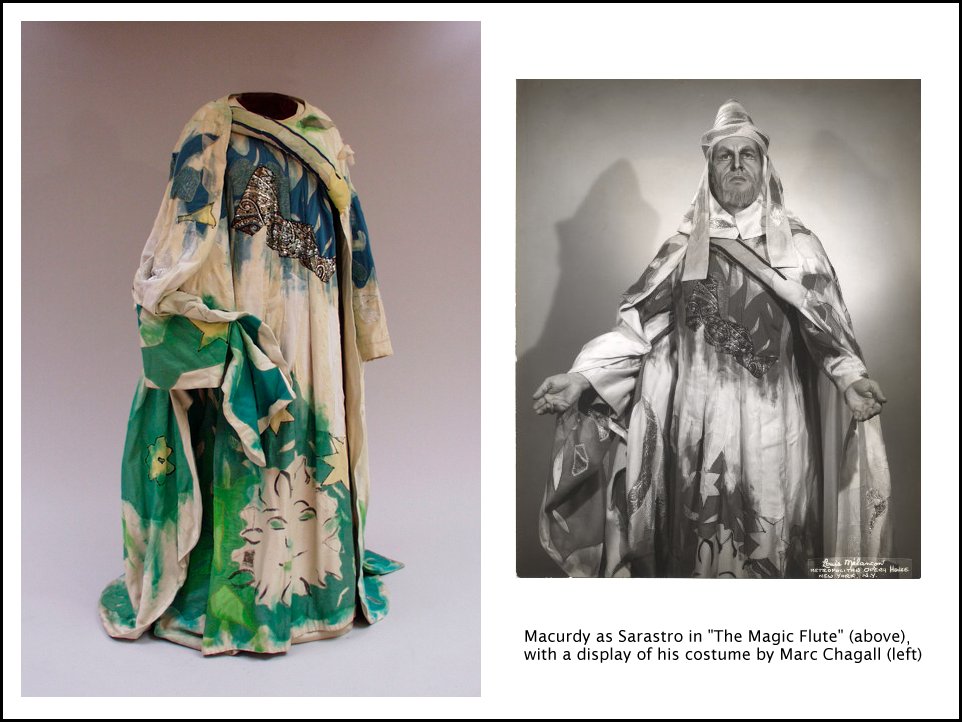
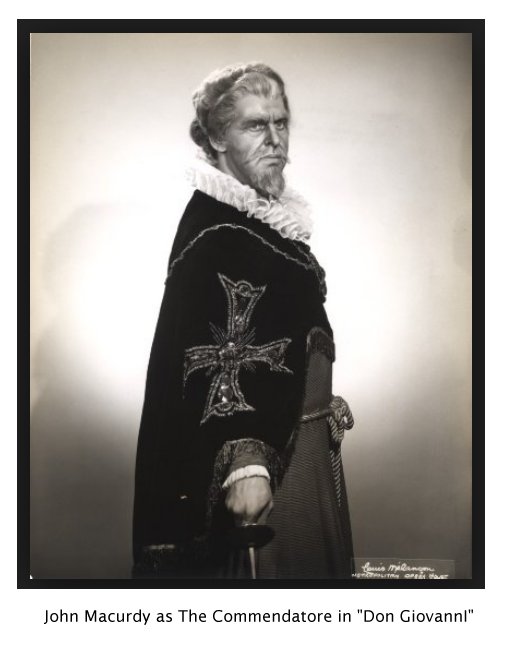 BD: Sure.
BD: Sure.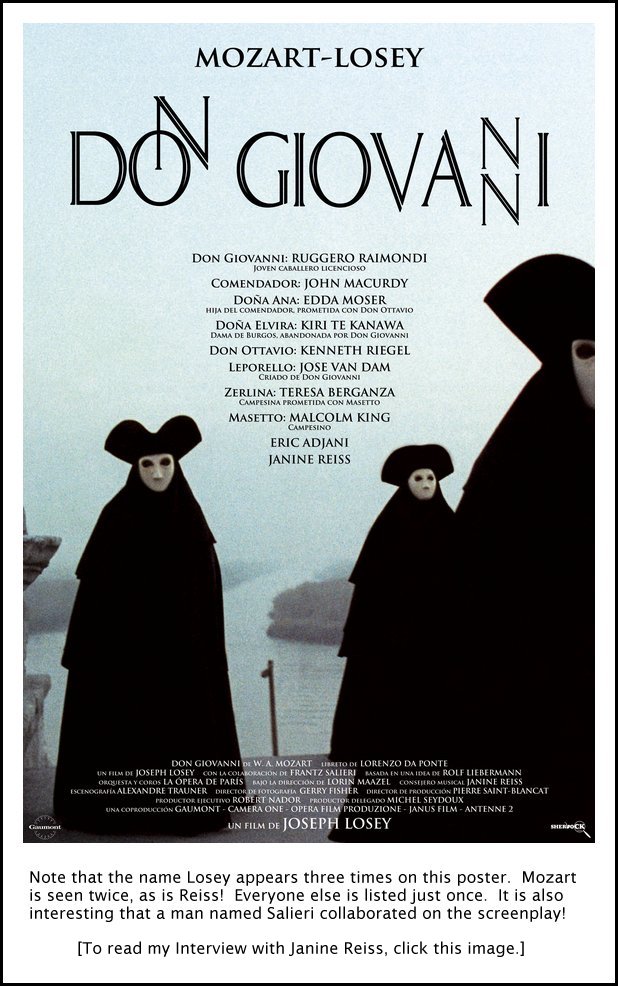 BD: Now 97% of
the households
have at least one television.
BD: Now 97% of
the households
have at least one television.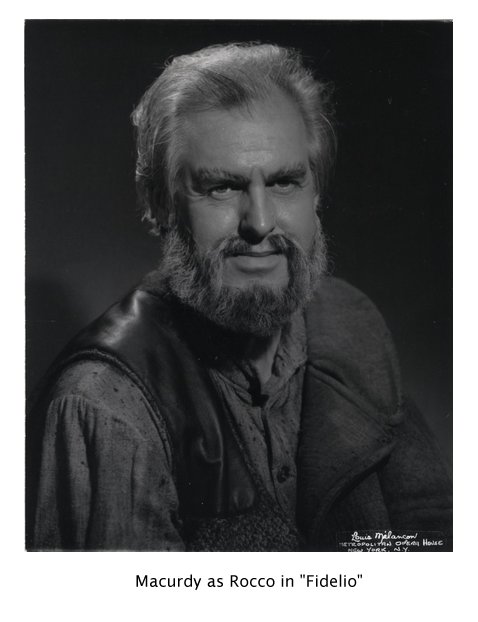 BD: It makes you
think about the characters and odd
relationships, and gives you ideas?
BD: It makes you
think about the characters and odd
relationships, and gives you ideas?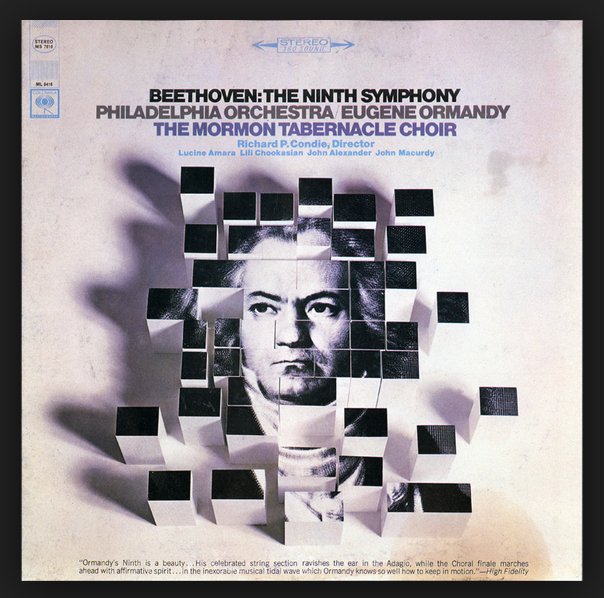 JM: We popularize
it! A few years ago I
heard the Swingle Singers or somebody like that
something on Beethoven. May be some
group could popularize Wagner in the same way. It was done very
tastefully at that.
JM: We popularize
it! A few years ago I
heard the Swingle Singers or somebody like that
something on Beethoven. May be some
group could popularize Wagner in the same way. It was done very
tastefully at that.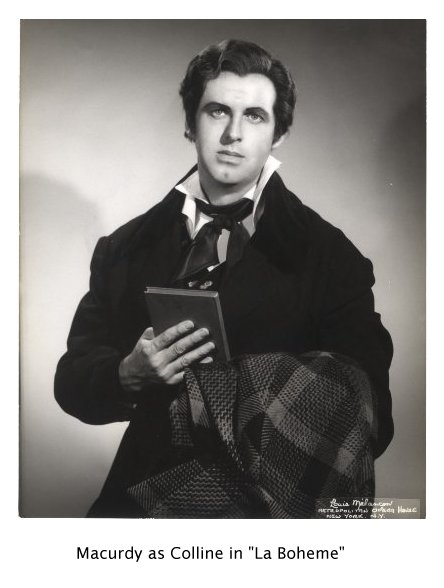 BD: But every once
in a while you get someone
like Hans Sotin
moving up from the bass into Wotan.
BD: But every once
in a while you get someone
like Hans Sotin
moving up from the bass into Wotan.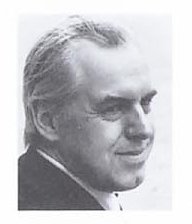 BD: What kind of
personality is Daland? Is he money grubbing as a lot of people
try to
make him out, or is he just an opportunist?
BD: What kind of
personality is Daland? Is he money grubbing as a lot of people
try to
make him out, or is he just an opportunist?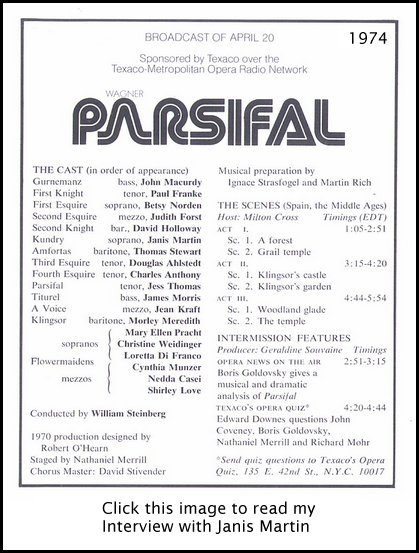 JM: Last year
the Met had a
problem in their Parsifal.
I was doing Oroveso, and they called me and said they needed some
help to protect the performance! I told them I could probably
have it sixty per cent back
in my head by tomorrow night, but by Saturday I would have it
completely
rememorized. I hadn’t done the opera in four years. [Vis-à-vis the image at right
listing the 1974 broadcast, see my Interview with Boris
Goldovsky, and my Interview
with Edward Downes.]
JM: Last year
the Met had a
problem in their Parsifal.
I was doing Oroveso, and they called me and said they needed some
help to protect the performance! I told them I could probably
have it sixty per cent back
in my head by tomorrow night, but by Saturday I would have it
completely
rememorized. I hadn’t done the opera in four years. [Vis-à-vis the image at right
listing the 1974 broadcast, see my Interview with Boris
Goldovsky, and my Interview
with Edward Downes.] 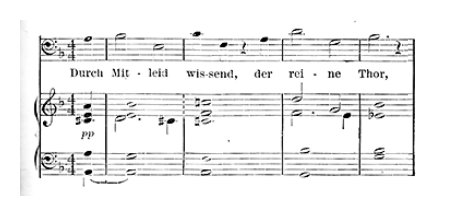 BD: Does Gurnemanz
realize it at that point? [Note:
Despite being spelled ‘Thor’ in the musical example at left, the
correct word is ‘Tor’.]
BD: Does Gurnemanz
realize it at that point? [Note:
Despite being spelled ‘Thor’ in the musical example at left, the
correct word is ‘Tor’.]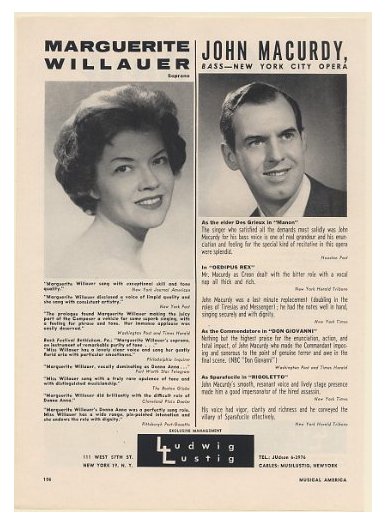 JM: Maybe he didn’t
have a singer that could encompass
both of them. It’s an
interesting thing this idea. I’ve done Tannhaüser with Leonie as
Elisabeth, and in the production we did we had Grace (Bumbry) as
Venus. [James
McCracken sang the title role, and James Levine conducted.]
The vocal
requirements are different however, but if you have one singer that can
encompass it, it’s a certainly a great thing to be able to
play this other person and then come back for this wonderful
schoolgirl effect that Elisabeth is. She really wants to make it
with Tannhaüser, and he is her fantasy. Maybe the opening
act
is both of their fantasies laid out before us and we haven’t
even thought of it in that way. Actually you can find all kinds
of
values in these operas if you want to look beyond the
parameters that are generally used.
JM: Maybe he didn’t
have a singer that could encompass
both of them. It’s an
interesting thing this idea. I’ve done Tannhaüser with Leonie as
Elisabeth, and in the production we did we had Grace (Bumbry) as
Venus. [James
McCracken sang the title role, and James Levine conducted.]
The vocal
requirements are different however, but if you have one singer that can
encompass it, it’s a certainly a great thing to be able to
play this other person and then come back for this wonderful
schoolgirl effect that Elisabeth is. She really wants to make it
with Tannhaüser, and he is her fantasy. Maybe the opening
act
is both of their fantasies laid out before us and we haven’t
even thought of it in that way. Actually you can find all kinds
of
values in these operas if you want to look beyond the
parameters that are generally used.© 1980 Bruce Duffie
This conversation was recorded in Chicago on December 11, 1980. This transcription was made in 2015, and posted on this website at that time. My thanks to British soprano Una Barry for her help in preparing this website presentation.
To see a full list (with links) of interviews which have been transcribed and posted on this website, click here.
Award - winning broadcaster Bruce Duffie was with WNIB, Classical 97 in Chicago from 1975 until its final moment as a classical station in February of 2001. His interviews have also appeared in various magazines and journals since 1980, and he now continues his broadcast series on WNUR-FM, as well as on Contemporary Classical Internet Radio.
You are invited to visit his website for more information about his work, including selected transcripts of other interviews, plus a full list of his guests. He would also like to call your attention to the photos and information about his grandfather, who was a pioneer in the automotive field more than a century ago. You may also send him E-Mail with comments, questions and suggestions.